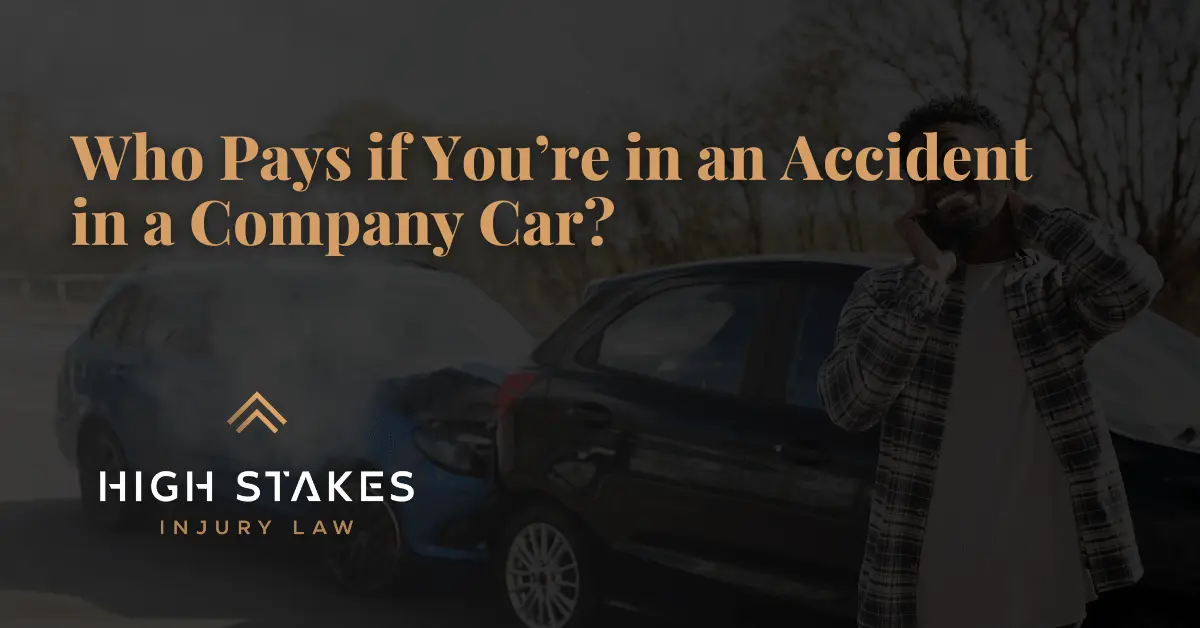Am I Responsible If I Wreck the Company Car?
If you’re involved in a car accident in Las Vegas while driving a company car, you may be wondering who is responsible for paying for any damages or injuries that result. The answer to this question can be complicated, as it depends on a variety of factors, including the specific circumstances of the accident and the laws in your state.
What is Vicarious Liability?
Vicarious liability is a legal doctrine that holds an employer responsible for the actions of its employees. In the context of car accidents, it means that if an employee causes an accident while driving a company car, the employer may be held liable for any damages or injuries that result.
In Nevada, like in many other states, vicarious liability can arise under the doctrine of respondent superior, which means “let the master answer” in Latin. Under this doctrine, an employer can be held liable for the negligent actions of their employees if those actions were committed within the scope of their employment.
To illustrate the legal issues surrounding accidents in company cars, let’s consider a few hypothetical scenarios:
- Scenario 1: John works for a delivery company and is driving a company van when he rear-ends another car at a stoplight. The driver of the other car is injured and sues John’s employer for damages. In this case, John’s employer may be held vicariously liable for the accident, as John was acting within the scope of his employment at the time of the accident.
- Scenario 2: Sarah works for a marketing firm and is driving a company car to a client meeting when she runs a red light and hits another car. The driver of the other car is injured and sues Sarah’s employer for damages. In this case, Sarah’s employer may be held vicariously liable for the accident, as Sarah was acting within the scope of her employment at the time of the accident.
- Scenario 3: Tom works for a construction company and is driving a company truck to a job site when he swerves to avoid hitting a pedestrian and crashes into a parked car. The owner of the parked car sues Tom’s employer for damages. In this case, Tom’s employer may not be held vicariously liable for the accident, as Tom was not acting within the scope of his employment at the time of the accident.
As these examples illustrate, the question of who pays for damages and injuries in accidents involving company cars can be complex and depends on a variety of factors.
What Other Factors Are Taken into Consideration?
Here are some key factors to consider when determining if an employer may be held vicariously liable for an employee’s actions in a company car accident:
- Scope of employment: The employee must have been acting within the scope of their employment when the accident occurred. This generally means that the employee was performing job duties or engaging in activities that furthered the employer’s interests.
- Employee’s actions: If the employee was acting negligently or recklessly, the employer might be held liable for the resulting damages. However, if the employee’s actions were intentional or criminal, the employer might not be held responsible.
- Permission to use the company car: If the employee had explicit or implicit permission to use the company car for work-related purposes, it could increase the likelihood of the employer being held vicariously liable.
- Independent contractors: Employers are generally not liable for the actions of independent contractors. However, if the employer has significant control over the independent contractor’s work or the relationship is functionally similar to that of an employer-employee, the employer might still be held liable.
It’s important to note that the specific facts of each case will determine whether an employer can be held vicariously liable for an employee’s actions in a company car accident. Additionally, liability might be limited by the terms of insurance policies or state laws.
How Can a Lawyer Help?
If you’re involved in an accident while driving a company car, it’s important to consult with a lawyer who has experience in this area of the law. A lawyer can help you navigate the legal issues surrounding accidents in company cars, including determining who may be held liable for any damages or injuries that result.
Some of the ways a lawyer can help after a wreck in a company car
- Investigating the accident: A lawyer can conduct a thorough investigation of the accident to determine who was at fault and what factors contributed to the accident.
- Negotiating with insurance companies: A lawyer can negotiate with insurance companies on your behalf to ensure that you receive fair compensation for any damages or injuries that result from the accident.
- Representing you in court: If necessary, a lawyer can represent you in court to pursue a legal claim for damages or injuries resulting from the accident.
Contact High Stakes Injury Law in Las Vegas
Accidents in company cars can be complicated legal issues that require the knowledge of an experienced attorney. By understanding key legal terms, background case law, and examples, you can better navigate the legal issues surrounding accidents in company cars and ensure that you receive fair compensation for any damages or injuries that result.
If you or someone you know has been involved in an accident in a company car in Nevada, call High Stakes Injury Law at (702) 605-6671 for a free case review/evaluation.



